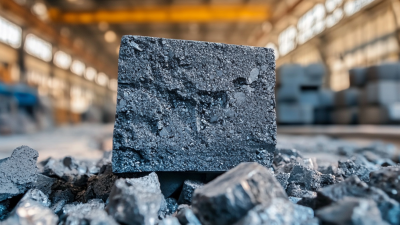Leave Your Message
 Metal Silicon plays a pivotal role in contemporary technologies, driving advancements in various sectors, particularly in electronics and renewable energy. According to the International Silicon Industry Association, the global demand for Metal Silicon is projected to exceed 2 million metric tons by 2025, underscoring its critical importance in the production of high-performance materials. As industries increasingly focus on sustainable solutions, the versatility of Metal Silicon offers a pathway to improve energy efficiency and reduce carbon emissions. For instance, its use in solar cell production is expected to grow significantly, as it accounts for approximately 90% of the material used in photovoltaic technologies.
Metal Silicon plays a pivotal role in contemporary technologies, driving advancements in various sectors, particularly in electronics and renewable energy. According to the International Silicon Industry Association, the global demand for Metal Silicon is projected to exceed 2 million metric tons by 2025, underscoring its critical importance in the production of high-performance materials. As industries increasingly focus on sustainable solutions, the versatility of Metal Silicon offers a pathway to improve energy efficiency and reduce carbon emissions. For instance, its use in solar cell production is expected to grow significantly, as it accounts for approximately 90% of the material used in photovoltaic technologies.
Furthermore, with ongoing innovations in alloy development and the electric vehicle market, Metal Silicon is poised to be a cornerstone in achieving sustainable industrial practices. This exploration highlights the essential contributions of Metal Silicon in shaping a greener future while meeting the technological demands of the modern world.
Metal silicon, a vital component in contemporary technologies, exhibits unique properties that make it indispensable in various applications. Its semi-conductive nature places it at the forefront of the electronics industry, particularly in the manufacturing of microchips and solar cells.
Silicon's versatility extends to energy storage as well, where metal silicide-based anodes are gaining attention for their efficiency and functionality. The ability to integrate these materials into cutting-edge devices reflects the critical role that metal silicon plays in driving innovation.
Exploring the characteristics of metal silicon also reveals its potential in sustainable solutions. As the search for eco-friendly alternatives intensifies, the properties of silicon metal and its derivatives hold promise for replacing traditional materials that have a significant environmental impact. For instance, research into silicon nanowires is revealing exciting applications in biomarker detection, highlighting the material's adaptability beyond conventional uses. As modern technologies evolve, understanding the multifunctional properties of metal silicon will be essential for developing advanced, sustainable solutions.
Metal silicon plays a pivotal role in numerous key industries, particularly in electronics, solar energy, and automotive applications. In the semiconductor industry, for instance, metal silicon, primarily in the form of high-purity silicon, is essential for the production of integrated circuits. According to a report from Market Research Future, the global semiconductor market is projected to reach $730 billion by 2025, with silicon playing a central role in this growth as manufacturers seek to enhance efficiency and performance.
Moreover, the renewable energy sector significantly benefits from metal silicon, especially in the production of photovoltaic (PV) cells for solar panels. The International Energy Agency (IEA) reported that solar energy capacity reached 710 GW in 2019, with a substantial portion attributable to silicon-based cells. As the global push for sustainable energy solutions continues, the demand for metallurgical-grade silicon is expected to surge, providing an effective pathway for harnessing solar power more efficiently and affordably.
In the automotive industry, metal silicon is gaining attention for its application in lightweight and durable materials. The incorporation of silicon into aluminum alloys results in reductions in vehicle weight, thereby improving fuel efficiency and reducing emissions. The global market for silicon in automotive applications is anticipated to grow significantly, driven by advancements in electric vehicle technology and stricter emission regulations, according to a report by Grand View Research. These developments underline the critical role that metal silicon plays in fostering innovation across various sectors while supporting sustainable solutions.

The utilization of metal silicon in modern technologies has gained significant momentum, especially within the context of sustainable practices aimed at advancing green technologies. As the semiconductor industry, which forms the backbone of our digital economy, progresses towards a more sustainable future, metal silicon plays a crucial role. The Global Semiconductor Recycling and Sustainability Market is projected to grow at a CAGR of 15%, largely driven by the need for sustainable sourcing and recycling practices to enhance circularity in critical materials. The trend denotes a shift towards recycling silicon semiconductors, thereby reducing waste and promoting resource efficiency.
Moreover, innovations in sustainable mining practices are emerging as the industry seeks to mitigate environmental impacts. By adopting cutting-edge technologies and methods, mining operations can significantly reduce their carbon footprint while ensuring a steady supply of essential materials, including metal silicon. Recent developments highlight an industry-wide commitment to embracing circular economy principles, where waste from one process becomes a resource for another. This synergy between green energy technologies and critical materials recycling not only fosters a sustainable green economy but also contributes to achieving broader environmental objectives. The ongoing green revolution in silicon is indicative of how industries can harmonize technological advancement with ecological responsibility.
The recycling of solar panels is becoming an essential aspect of modern sustainability efforts, particularly in Asia, where innovative technologies are being developed to convert waste into valuable resources. The global solar panel recycling market is projected to grow significantly, reaching approximately $274.21 million by 2024 and soaring to nearly $2.49 billion by 2032, with a remarkable compound annual growth rate of 31.75%. This rapid growth highlights the increasing recognition of the importance of recycling in the quest for sustainable solutions.
One groundbreaking approach involves recycling solar panels to produce hydrogen and purified water, transforming an environmental challenge into an opportunity for sustainable energy production. This technology not only addresses the looming issue of waste management but also contributes to the green revolution by generating clean hydrogen fuel, an essential component for future energy systems. As Asian countries lead the charge, this strategy may serve as a model for globally addressing renewable energy challenges.
Tips for engaging in sustainable practices include investing in technologies that facilitate recycling processes and supporting policies that encourage solar panel recovery initiatives. Additionally, businesses can explore partnerships with recycling firms to enhance their sustainability profiles. Embracing such practices will help foster a circular economy and ensure that valuable materials like metal silicon are continuously utilized rather than discarded.
| Application Area | Metal Silicon Type | Recycling Method | Environmental Benefit | Market Demand (2023) |
|---|---|---|---|---|
| Solar Energy Systems | High-purity Silicon | Mechanical Recycling | Reduction in mining waste | $25 Billion |
| Electronics | Metallurgical Silicon | Chemical Recycling | Lower carbon footprint | $15 Billion |
| Automotive | Silicon Alloy | Pyrometallurgical Recycling | Resource conservation | $10 Billion |
| Construction Materials | Silicon Metal | Hydrometallurgical Recycling | Waste reduction in landfills | $5 Billion |
Metal silicon plays a crucial role in modern manufacturing, acting as a critical input in the production of semiconductors, solar panels, and aluminum alloys. According to a report by Research and Markets, the global silicon materials market is projected to reach $13.93 billion by 2027, growing at a CAGR of 6.5% from 2020. This growth is driven by the increasing demand for electronic devices and renewable energy technologies, which rely heavily on high-purity silicon for enhanced performance and efficiency.
The economic impact of metal silicon extends beyond just the materials sector; it also influences job creation and regional development. The silicon industry supports approximately 150,000 jobs in the U.S. alone, supplying materials essential for the aerospace, automotive, and telecommunication sectors. Moreover, as companies shift towards sustainable solutions, the demand for silicon in green technologies, such as lithium-silicon batteries for electric vehicles, is expected to surge. According to a study by Fortune Business Insights, the market for silicon-based batteries is projected to grow from $0.4 billion in 2020 to $3.2 billion by 2028, highlighting the economic significance of metal silicon in fostering innovation and sustainable practices within the manufacturing landscape.







